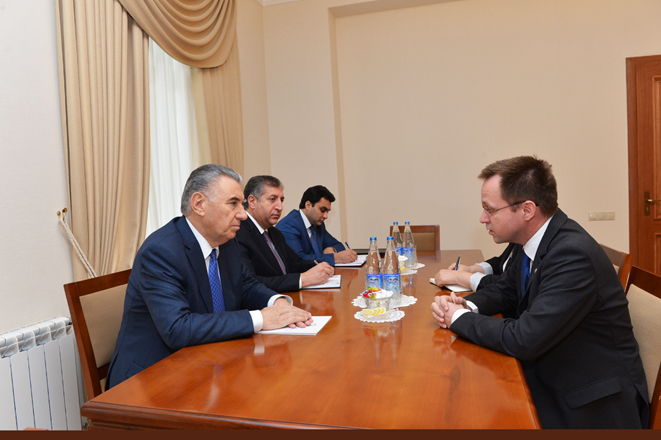Azerbaijan's patience not unlimited on Nagorno-Karabakh conflict

By Sara Rajabova
The Armenian-Azerbaijani Nagorno-Karabakh conflict has to be resolved because Azerbaijan's patience is not unlimited on this issue.
Ali Hasanov, Azerbaijan’s Deputy Prime Minister, Chairman of the State Committee on Deals of Refugees and Internally Displaced Persons made the remark at a meeting with newly appointed Norwegian Ambassador to Azerbaijan Bard Ivar Svendsen on December 15, the Committee said.
Hasanov briefed the ambassador about the Armenian-Azerbaijani Nagorno-Karabakh conflict and 1.2 million refugees and IDPs, who were expelled from native lands as a result of the conflict. He gave detailed information on the measures undertaken to resolve their problems.
He expressed regret at the fact that international organizations such as the OSCE Minsk Group, a mediator in resolving the conflict, remain indifferent towards the unconstructive position of Armenia, as well as the fact that the four resolutions adopted by the UN Security Council, are still on paper.
Hasanov went on to note that the situation cannot last for a long time as Azerbaijan's patience is not unlimited.
The precarious cease-fire between Azerbaijan and Armenia was reached after a lengthy war that displaced over a million Azerbaijanis. It has been in place between the two South Caucasus countries since 1994. Since the beginning of the hostilities, Armenian armed forces have occupied over 20 percent of Azerbaijan's internationally recognized territory, including the Nagorno-Karabakh region and seven surrounding districts.
The UN Security Council has adopted four resolutions on Armenia's withdrawal from the Azerbaijani territory, but they have not been enforced to this day.
Hasanov further said considerable works have been carried out to improve social and living conditions of the refugees, adding that to date, 89 villages of the modern type were put into operation in different regions of the country and Baku at the expense of the State Oil Fund. He said more than 240,000 refugees and IDPs were settled in these villages.
At the same time, more than 370 thousand people are still living in difficult conditions, but some the works are underway to improve their social and living conditions, Hasanov said.
After the Karabakh war, the refugees and IDPs were temporarily settled in more than 1,600 settlements across 62 cities and regions of Azerbaijan. The Azerbaijanis who were displaced from their homes as result of the brutal war were forced to live in refugee camps, tents and wagons in very difficult conditions.
Moreover, thousands of Azerbaijanis have been expelled from Armenia and become refugees due to Armenia's ethnic cleansing policy after the emergence of the Nagorno-Karabakh conflict with Azerbaijan.
Hasanov also praised the projects carried out by Norwegian international humanitarian organizations in this field.
Svendsen, for his part, said for discovering the real situation of refugees and IDPs, he will visit the territory of their residence. He also expressed satisfaction with the comprehensive development of the country, and expansion of cooperation.
Praising the economic relations between the two countries, Svendsen said these relations will develop incrementally.
Here we are to serve you with news right now. It does not cost much, but worth your attention.
Choose to support open, independent, quality journalism and subscribe on a monthly basis.
By subscribing to our online newspaper, you can have full digital access to all news, analysis, and much more.
You can also follow AzerNEWS on Twitter @AzerNewsAz or Facebook @AzerNewsNewspaper
Thank you!
